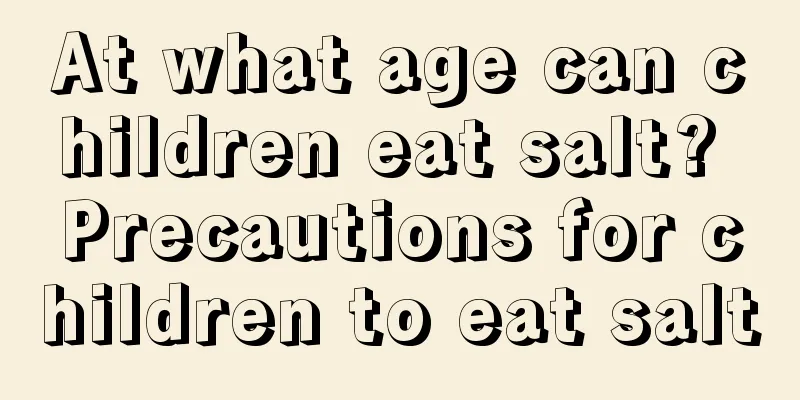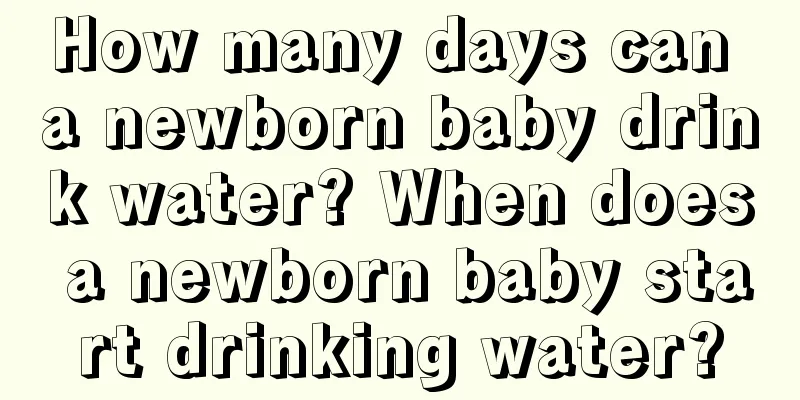At what age can children eat salt? Precautions for children to eat salt

|
At what age can children eat salt? When the baby starts eating complementary food after six months, parents will face the question of whether to add salt. Today, I will introduce to you in detail the precautions for children to eat salt. If you want to know what problems your baby may have when eating salt, I will introduce them to you below. How old can children eat salt?According to the latest version of the "Dietary Reference Intake of Chinese Residents", children aged 1-3 years old need 700 mg of sodium (equivalent to 1.8 g of salt) per day, which is 350 mg more than babies aged 6-12 months. But under normal circumstances, it is also possible to get enough sodium from food, such as milk, staple food, meat, green leafy vegetables, fruits, etc. Therefore, in the feeding of infants and young children, unless there are special circumstances, children under 1 year old should not be given salt, and children aged 1-3 years old should also try to eat less salt or even no salt, so that babies can better appreciate the natural taste of food and reduce the incidence of hypertension and cardiovascular and cerebrovascular diseases in the future. Children aged 4-6 need about 900 mg of sodium (equivalent to 2.3 grams of salt) every day. In addition to the sodium contained in the food itself, the part of sodium that must be obtained through salt is not much, 1-2 grams of salt is enough. Children over 6 years old should control the amount of salt to 3-5 grams. 5 major hazards of high-salt diet to babies1. A high-salt diet can reduce oral saliva secretion and lysozyme accordingly, which is conducive to the existence of various bacteria and viruses in the upper respiratory tract. 2. After a high-salt diet, the osmotic effect of salt can kill the normal parasitic flora in the upper respiratory tract, causing dysbacteriosis and leading to illness. 3. A high-salt diet can inhibit the reproduction of oral mucosal epithelial cells, causing them to lose their disease resistance. 4. A high-salt diet will affect the absorption of zinc in children and cause zinc deficiency in children. 5. A high-salt diet will increase the burden on the baby's heart and kidneys. The baby's kidneys are not fully developed and cannot absorb too much salt. If too much salt is added to the complementary food, it will increase the burden on the baby's kidneys and heart, thereby damaging the kidney and heart functions. Moreover, if a child develops a high-salt diet habit from an early age, it will not be easy to correct it when he grows up, and a high-salt diet habit can easily cause diseases such as high blood pressure. Pediatrician Cui Yutao recommends not adding salt to food for babies under one year old. For babies over one year old, as long as the child can accept food without salt, there is no need to deliberately add salt. When the child's interest in food decreases, gradually add salt in small amounts. Light food is good for a person's health throughout his life! Never add salt to babies according to the appetite of adults. The amount of salt added should be determined according to the child's acceptance. Precautions for children to eat saltBabies over 2 years old should gradually eat with adults, and attention should be paid to cooking with lighter flavors. Parents must pay attention when choosing food. Many processed foods have high salt content, such as snacks, biscuits, soups, broths, pizza, cheese, sausages, potato chips, pickled foods, etc., and are not suitable for babies. Foods suitable for babies include fresh fruits, vegetables, lean meat, poultry and fish, eggs, beans, milk, etc. Some parents worry that less salt will make the food tasteless and affect their baby's appetite. In fact, this worry is unnecessary because food itself has its own natural taste and we cannot judge the baby's taste by adult standards. Babies who eat less salt food will lay a good foundation for their healthy growth in the future. |
Recommend
Is Kunling's second child a boy or a girl?
Kunling's first child was Xiao Zhou Zhou, a c...
Does toothpaste have the effect of reducing inflammation and swelling? What does the color bar at the end of the toothpaste represent?
I don't know why my gums have been swollen re...
How many months can a newborn baby be held upright? The correct posture for holding a baby upright
When facing a newborn baby, many parents are lear...
Can pregnant women eat silkworm pupae? What are the benefits of eating silkworm pupae for pregnant women?
Silkworm pupae are rich in nutrients, high in pro...
Why does the belly turn black during pregnancy? Hormone changes in the body
Hormonal changes in the body cause pigmentation i...
What to do if your child is anxious when he or she just starts kindergarten
Baby learning needs to start from kindergarten, a...
Is it normal for a one month old baby to fart frequently?
Babies often fart after being born for more than ...
Can Lion toothpaste be swallowed? How long does it take for Lion toothpaste to be effective?
Lion toothpaste is said to be safe to use and doe...
What does breast milk taste like? It tastes sweet.
Breast milk is the most suitable food for babies....
Can babies have their heads shaved in the summer? Is it good for babies to have their heads shaved in the summer?
The weather is getting hotter and hotter. Many pa...
How to open the bottle cap of Omo laundry detergent? Which one is better, Omo or Liby?
Omo and Liby are two brands of laundry detergent ...
Do you regret having only one child?
In the past, people only had one child under the ...
Can orthokeratology prevent myopia? Can orthokeratology correct myopia?
Myopia has always been the most important issue f...
Can pregnant women eat snake meat? Dietary taboos and precautions for pregnant women
Pregnant women are in a very fragile physical sta...
How many meals a day should a baby eat after weaning? What should be paid attention to in diet?
When the baby grows to 6 months old, breast milk ...









